Japan-Germany Relations
Visit by Federal Chancellor Scholz to Japan
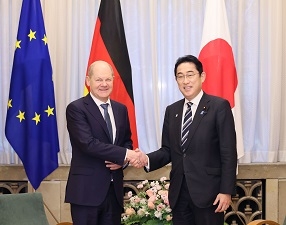 (Photo: Cabinet Public Affairs Office)
(Photo: Cabinet Public Affairs Office)
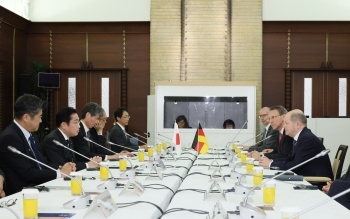 (Photo: Cabinet Public Affairs Office)
(Photo: Cabinet Public Affairs Office)
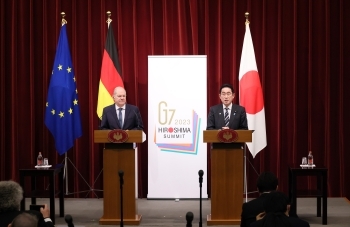 (Photo: Cabinet Public Affairs Office)
(Photo: Cabinet Public Affairs Office)
On March 18, Japan-Germany summit meeting and bilateral Inter-Government Consultations were held in Tokyo, on occasion of the visit by H.E. Mr. Olaf Scholz, Chancellor of the Federal Republic of Germany, who was on an official visit to Japan. The overview of the meetings and dinner is as follows.
1. Japan-Germany Summit Meeting
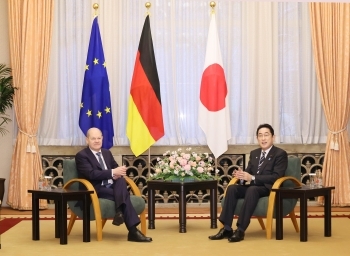 (Photo: Cabinet Public Affairs Office)
(Photo: Cabinet Public Affairs Office)
On March 18, commencing at 15:30 for about 50 minutes, Prime Minister Fumio Kishida held a summit meeting including a tête-à-tête (one-on-one meeting) with Federal Chancellor Scholz.
- (1) Opening Remarks
PM Kishida welcomed Chancellor Scholz's first visit to Japan in a year and stated that he was pleased to see that the ties between Germany and Japan are stronger and closer than ever, with increased visits of dignitaries between the two countries. PM Kishida also stated that the Inter-Governmental Consultations that the two leaders had agreed to launch last April are an important framework for further expanding and deepening cooperation between Japan and Germany sharing fundamental values, and that he would like to discuss for specific outcomes with relevant ministers from both countries in the plenary session. Chancellor Scholz thanked PM Kishida for his warm welcome and expressed his willingness for cooperation between Germany and Japan as the G7 chair for the last year and this year respectively. - (2) Bilateral Relations
PM Kishida stated that the security of Europe and the Indo-Pacific are inseparable. He also explained the National Security Strategy which had been developed by the Japanese Government late last year, which gained the understanding and support of Chancellor Scholz. Given these backgrounds, PM Kishida highly appreciated Germany's increased interests and involvement in the Indo-Pacific. Both sides welcomed the ongoing cooperation in the security field as both countries have been making progress in security efforts, and confirmed that Germany and Japan will continue to closely coordinate to realize a "Free and Open Indo-Pacific" (FOIP). PM Kishida also reiterated his request for Germany's cooperation in the early elimination of the EU's measures to restrict imports of Japanese food products. - (3) Russia’s Aggression against Ukraine
Amid the harsh war situation in Ukraine, the two leaders condemned in the strongest terms Russia's aggression against Ukraine and demanded Russia's immediate and unconditional withdrawal from Ukraine. They also shared the view that it is important for the G7 and like-minded countries to unite to end Russia's aggression as soon as possible, to continue to impose strict sanctions against Russia as wel as to provide strong support for Ukraine, and keep sending a clear message that Russia must not threaten, with nuclear weapons, let alone its use. - (4) Situation in East Asia
Both leaders strongly opposed attempts to unilaterally change the status quo by force in the East China Sea and South China Sea. The two leaders also shared serious concerns over North Korea's increased nuclear and missile activities and confirmed that they will continue to work together in dealing with North Korea, including the abductions issue. - (5) Multilateral Diplomacy
The two leaders also confirmed that they will work closely to resolve global challenges facing the international community, such as strengthening the functions of the United Nations, including a Security Council reform, as well as nuclear disarmament and non-proliferation.
2. Inter-Governmental Consultations (IGC)
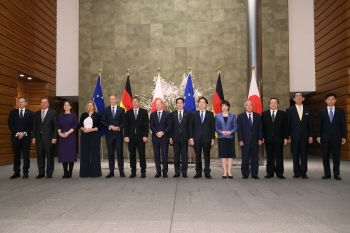 (Photo: Cabinet Public Affairs Office)
(Photo: Cabinet Public Affairs Office)
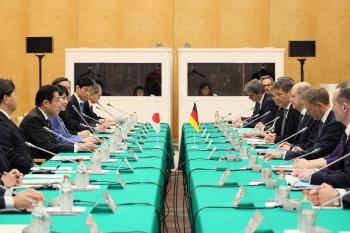 (Photo: Cabinet Public Affairs Office)
(Photo: Cabinet Public Affairs Office)
- (1) The plenary session of the first meeting of the Japan-Germany Inter-Governmental Consultations was held from 16:40. for about 85 minutes. Prime Minister Kishida of Japan and Chancellor Scholz of Germany co-chaired the meeting, which was attended by relevant ministers from both sides. A joint statement was issued after the meeting.
- (2) The main theme of the meeting was economic security, and the participants exchanged a wide range of views on related issues.
- (a) At the beginning of the session, PM Kishida stated that the Intergovernmental Consultations are a framework to advance concrete cooperation between Japan and Germany, which share fundamental values, for the sake of global peace and prosperity, and that the IGC will take the close Japan-Germany relationship to new heights, and welcomed the first holding of the meeting.
- (b) Both sides discussed the role of the two countries in economic security and related global issues, including economic coercion, non-market policies and practices, protection and fostering of critical and emerging technologies, protection of critical infrastructure, countering malicious activities in cyber space, supply chain resilience, promoting transparent and fair development finance, energy and food security, and conqurred to enhance cooperation to address these challenges.
Both sides emphasized that economic security is important not only for the two countries but also for the whole international community, and confirmed their commitment to supporting economic resilience of developing and emerging countries. Both sides also confirmed their commitment to working closely for the success of the G7 Hiroshima Summit, as well as for efforts in the area of economic security. - (3) Next Meeting
Both sides confirmed that they will hold a next round of the IGC at an appropriate timing.
3. Discussions with Japanese and German business leaders
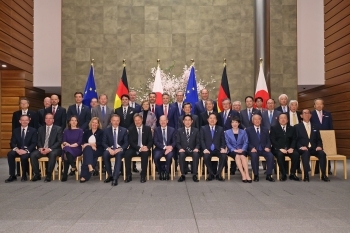 (Photo: Cabinet Public Affairs Office)
(Photo: Cabinet Public Affairs Office)
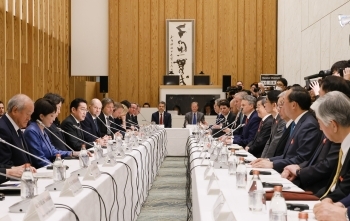 (Photo: Cabinet Public Affairs Office)
(Photo: Cabinet Public Affairs Office)
Following the IGC, PM Kishida, together with Federal Chancellor Scholz and relevant Japanese and German ministers, exchanged views with representatives from Japanese and German business communities, focuse on economic security for viewpoints of business activities.
4. Dinner hosted by the Prime Minister
PM Kishida hosted a dinner with Chancellor Scholz, relevant ministers, and business leaders from both countries, conducting straightforward for open discussion to further develop Japan-Germany relations in a wide range of fields, including economy.
(Reference1)Japan-Germany Inter-Governmantal Consultations (IGC)
During Chancellor Scholz's visit to Japan in April 2022, the leaders confirmed to launch inter-governmental consultations in the form of involving leaders and relevant ministers to advance cooperation in a wide range of fields.
(Reference2)Attached PDF
(Reference3)List of Participants
(Japan)
- Kishida Fumio, Prime Minister
- Hayashi Yoshimasa, Minister for Foreign Affairs
- Takaichi Sanae, Minister in charge of Economic Security
- Suzuki Shunichi, Minister of Finance
- Hamada Yasukazu, Minister of Defense
- Matsumoto Takeaki, Minister for Internal Affairs and Communications
- Nishimura Yasutoshi, Minister of Economy, Trade and Industry
(Germany)
- Olaf Scholz, Federal Chancellor
- Robert Habeck, Federal Minister for Economic Affairs and Climate Action
- Christian Lindner, Federal Minister of the Interior and Community
- Annalena Baerbock, Federal Minister for Foreign Affairs
- Boris Pistorius, Federal Minister of Defense
- Volker Wissing; Federal Minister for Digital and Transport


